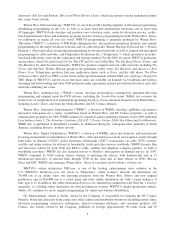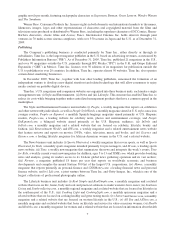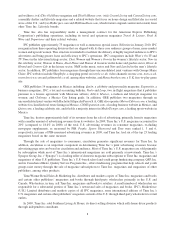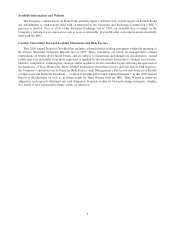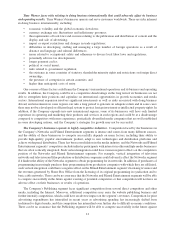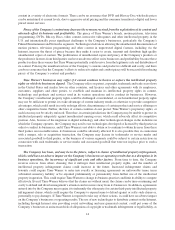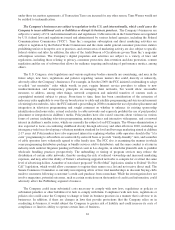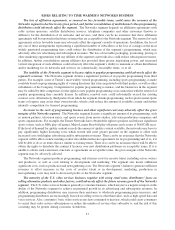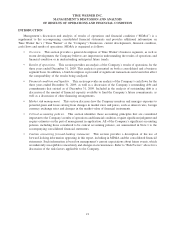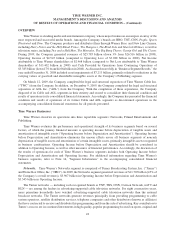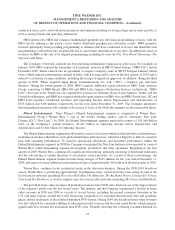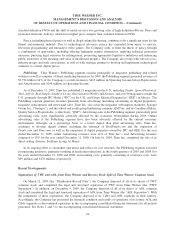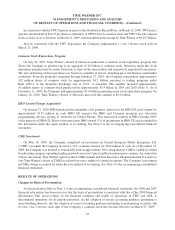Time Magazine 2009 Annual Report Download - page 27
Download and view the complete annual report
Please find page 27 of the 2009 Time Magazine annual report below. You can navigate through the pages in the report by either clicking on the pages listed below, or by using the keyword search tool below to find specific information within the annual report.well as cause them to incur significant technical, legal or other costs and limit their ability to provide competitive
content, features or tools.
The Company’s businesses are subject to labor interruption. The Company and certain of its suppliers retain
the services of writers, directors, actors, athletes, technicians, trade employees and others involved in the
development and production of motion pictures, television programs and magazines who are covered by
collective bargaining agreements. If the Company and its suppliers are unable to renew expiring collective
bargaining agreements, it is possible that the affected unions could take actions in the form of strikes, work
slowdowns or work stoppages. Such actions or the possibility of such actions could cause delays in the production or
the release dates of the Company’s feature films, television programs and magazines, as well as result in higher
costs either from such actions or less favorable terms of the applicable agreements on renewal.
The Company’s businesses rely heavily on network and information systems or other technology, and a
disruption or failure of such networks, systems or technology as a result of computer viruses, misappropriation of
data or other malfeasance, as well as outages, natural disasters, accidental releases of information or similar
events, may disrupt the Company’s businesses and damage its reputation. Because network and information
systems and other technologies are critical to many of Time Warner’s operating activities, network or information
system shutdowns or service disruptions caused by events such as computer hacking, dissemination of computer
viruses, worms and other destructive or disruptive software, denial of service attacks and other malicious activity, as
well as power outages, natural disasters, impairments to satellite systems used to transmit programming, terrorist
attacks and similar events, pose increasing risks. Such an event could have an adverse impact on the Company and
its customers, including degradation of service, service disruption and damage to equipment and data. Significant
incidents could result in a disruption of the Company’s operations, customer dissatisfaction, or a loss of customers
or revenues. Furthermore, the operating activities of Time Warner’s various businesses could be subject to risks
caused by misappropriation, misuse, leakage, falsification and accidental release or loss of information maintained
in the information technology systems and networks of the Company and third party vendors, including personnel,
customer and vendor data. The Company could be exposed to significant costs if such risks were to materialize, and
such events could damage the reputation and credibility of Time Warner and its businesses and have a negative
impact on its revenues. The Company also could be required to expend significant capital and other resources to
remedy any such security breach or to repair or replace networks or information systems.
If the AOL Separation or the TWC Separation is determined to be taxable for income tax purposes, Time
Warner and/or Time Warner’s stockholders who received shares of AOL or TWC in connection with the spin-offs
could incur significant income tax liabilities. In connection with the AOL Separation, Time Warner received an
opinion of counsel confirming that the AOL Separation will not result in the recognition, for U.S. Federal income
tax purposes, of gain or loss to Time Warner or its stockholders, except to the extent of cash received in lieu of
fractional shares. In connection with the TWC Separation, Time Warner received a private letter ruling from the
Internal Revenue Service (“IRS”) and opinions of counsel confirming that the TWC Separation should not result in
the recognition, for U.S. Federal income tax purposes, of gain or loss to Time Warner or its stockholders, except to
the extent of cash received in lieu of fractional shares. The IRS ruling and the opinions received in connection with
these transactions were based on, among other things, certain facts, assumptions, representations and undertakings
made by Time Warner and by AOL or TWC, as applicable. If any of these facts, assumptions, representations or
undertakings is incorrect or not otherwise satisfied, Time Warner and its stockholders may not be able to rely on the
relevant IRS ruling or opinion and could be subject to significant tax liabilities. Furthermore, opinions of counsel
are not binding on the IRS or state or local tax authorities or the courts, and a tax authority or court could determine
that the AOL Separation or the TWC Separation should be treated as a taxable transaction. Under the tax matters
agreement that Time Warner entered into with AOL, Time Warner is entitled to indemnification from AOL for taxes
resulting from the failure of the AOL Separation to qualify as tax-free (“AOL Transaction Taxes”) as a result of
(i) certain actions or failures to act by AOL or (ii) the failure of certain representations made by AOL to be true.
Similarly, under the tax matters agreement that Time Warner entered into with TWC, Time Warner is entitled to
indemnification from TWC for taxes resulting from the failure of the TWC Separation to qualify as tax-free (“TWC
Transaction Taxes” and, together with the AOL Transaction Taxes, the “Transaction Taxes”) as a result of (i) certain
actions or failures to act by TWC or (ii) the failure of certain representations made by TWC to be true. However,
15



